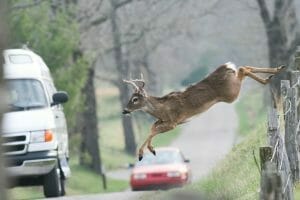It’s deer season again here in North Carolina and, although hunting the white tails may be popular, bagging a deer unintentionally with your motor vehicle isn’t a recommended method! Deer activity in NC increases significantly starting in October as temperatures are on the decrease and deer hormones are on the increase with the onset of mating season.
According to the NC Department of Transportation, which always urges drivers to be extra careful at this time of year for deer crossing the roads, there are nearly 20,000 vehicle-versus-animal accidents here annually. About 90% of these involve deer and most occur between the hours of 5 p.m.-7 a.m., when the animals are more difficult to see and they are most active. These deer-related accidents cause hundreds of crashes and human injuries every year and are even responsible for driver deaths in some cases. NC DOT says to remain alert at all times and to avoid a deer when possible but that it’s better to hit a deer than to lose control of your vehicle and be responsible for an even more serious accident.
Driver Safety Tips
Driver safety starts the minute you get into your vehicle and fasten your seat belt and, actually before that when you’re making sure your car or truck is in safe operating condition (lights, brakes, tires, clean windshield, etc). There are, however, specific things that can be done to help avoid a run-in with a deer this time of year:
- Reduce your speed when you see a deer crossing sign and in heavily wooded areas, especially during the hours of 5 p.m.-7 a.m.
- Use your high-beam headlights when you can and look for the telltale light reflection in the deer’s eyes.
- Deer often travel in small herds. If you see one cross the road, look for more to follow.
- When you see a deer on or near the road give a long, steady blast on your horn.
- Don’t suddenly swerve to keep from hitting a deer. You may flip your car or run into oncoming traffic.
- Don’t rely on devices such as deer whistles, which have not been proven to be effective.
You should report to authorities any injured or dead deer you hit. If you strike a deer and it causes damage to your vehicle or someone else’s property, contact your insurance agent as soon as possible.

